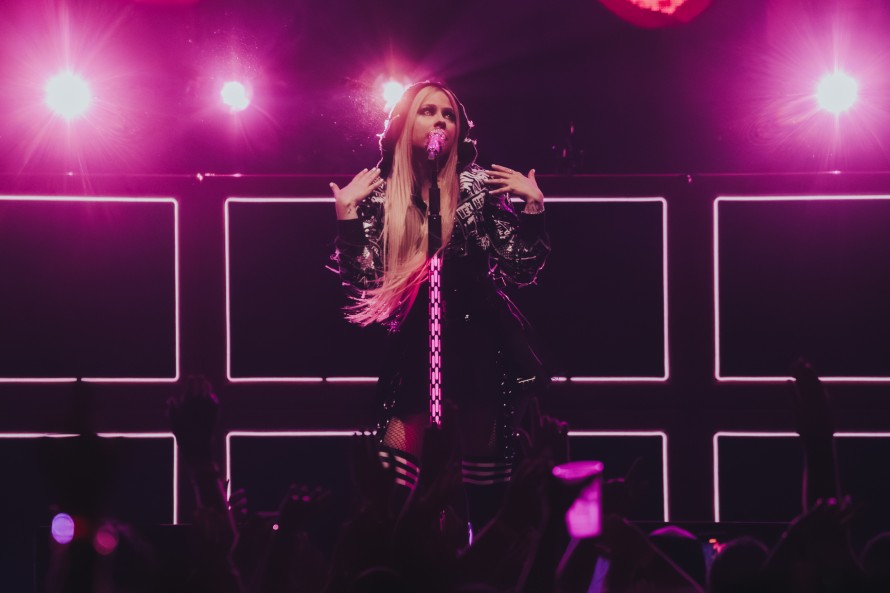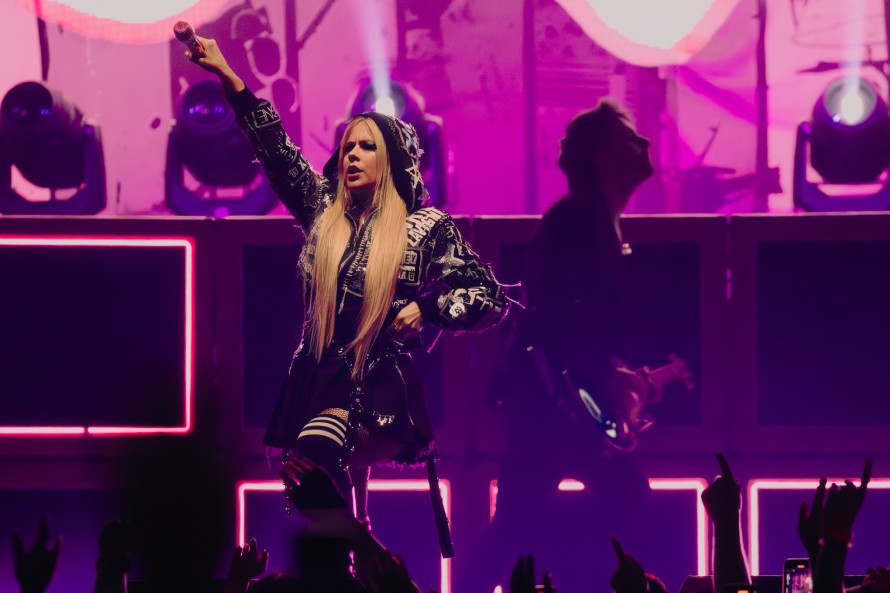It was 2003 when I first heard the riff of Avril Lavigne's "Losing Grip," the opening track of 2002's Let Go that skyrocketed the Napanee, Ontario native to global fame. At the ripe and impressionable age of eight, I remember not just hearing, but seeing Lavigne's sugar-laced soprano, accompanied by the rise and fall of Windows Media Player's audio visualizer.
A prismatic array of shifting colours and textures, I watched in fascination as Lavigne's distinctive voice ebbed and flowed with the early PC-era abstractions. Lavigne's teen girl declarations — "Are you aware of what you make me feel? Baby / Right now I feel invisible to you, like I'm not real" made way to a rising crescendo, the song reaching pop-punk heights in an anthemic chorus that provided to me, at that impressionable age, a blueprint for how to exist and navigate the world as a rebellious, rule-breaking, fist-fighting and Converse-kicking teenage girl. This was my first real introduction to music, and experiencing Let Go through this early-aughts technological vaporwave ushered in a decades long love for the industry, live music and beyond. To say it left an impression would be an understatement.
Avril Lavigne's music has been criticized over the years, as has Lavigne herself, for many things — her apparent resistant to independent songwriting, her palatable style of pop-punk, at times derivative in its repetitive themes, her ever-changing image, which seems to shift as quickly as the fickle tides of fame. But something Lavigne can not be criticized for is her distinct ability to connect with the intimacies of girlhood. Lavigne's own struggles navigating a brutally misogynistic and unforgiving music industry, one with iron-clad definitions of how femme pop stars can sing, look, speak, play and behave, in many ways mirrored the experiences of her young fans as they aged from girls to women. That experience — messy, imperfect and painful all at once — is nothing short of complicated.

Lavigne's September 18 appearance on stage at the Scotiabank Saddledome in Calgary highlighted her enduring ability to connect with women's experiences. It's that ability that drew a wide range of chart-topping singles, popular music videos, international artistic collaborations and more success in the years since her arrival to the industry in the early 2000s. Lavigne's discography, spanning seven albums, multiple global hit singles and two decades of mostly-consistent musical output, is certainly impressive — "Girlfriend," "My Happy Ending," "Complicated" and "Sk8er Boi" still evoke full-bodied singalongs from crowded stadiums, despite it being decades since their initial release. But as Lavigne rounds the victory lap of her legacy tour, she is far from content with being side-staged as a legacy artist.
"I'll tell you what, I'm really fucking excited to go home and make a new record," she declared to the crowd, a little tongue-in-cheek. "Oh yeah, the bitch will be back real soon." Words that were recognizably and distinctly Lavigne, with a self-assuredness that should put the whole Melissa doppelgänger discourse to rest forever. In this moment, she sounded every bit the 18-year-old who once declared herself a "rock chick" who likes to rock out:;"I like to throw shit around. I like to go nuts." Present in that very interview are hints of the factors that would haunt her throughout her career: "I like to get my anger out," she said. "And, you know what? Everyone has their own opinion on it. Everybody."
Everybody seems to have an opinion on Avril Lavigne. But what does she have to say about herself? Not too much, as evidenced by her full-bodied and faithful, albeit emotionally distant, Greatest Hits tour. Opening up to virtual displays of fuchsia pink and age-appropriate streetwear graphics, Avril emerged from the stage sporting her pop-punk finest: a short skirt, thigh highs, blonde hair extensions, black eye makeup and a bedazzled hoodie that bore her name and insignia. With a fist raised in a salute, she launched into the apple-biting anthem "Girlfriend," from 2007's The Best Damn Thing. The crowd dutifully echoed back every line, acting as a kind of mass catharsis for a fan base who have experienced their fair share of crappy men, snake-y girls and heartbreak. As she marched about the stage, it was clear how Avril's presence was ubiquitous with the anticipation, emergence and enduring popularity of early-aughts pop-punk and emo, her movements a dryer, more toned-down version of Gerard Way, Brendon Urie and Benjamin Kowalewicz's on-stage theatrics.
"Girlfriend" is not Avril's only song about stealing boyfriends from other girls. "Sk8er Boi," arguably the most recognizable single from 2002's Let Go, features lyrics whose meanings have grown murkier with age. "Sorry girl, but you missed out / Well tough luck, that boy's mine now / We are more than just good friends / This is how the story ends" is representative of an earlier, pick-me era of empowering pop music. The song echoes a time when being a confident, self-assured woman meant to be "not like other girls," a sentiment prevalent in the music of early aughts pop artists P!nk, Katy Perry, Demi Lovato, Shiloh and even a very young Taylor Swift. Although the themes of being true to oneself and resisting influence from male-driven patriarchy are consistent and sometimes even positive, these songs are still firmly written with the male ego in mind. In the contemporary fray of women-led pop music, this sentiment has inverted, ushering in a femininomenon of empowering girl pop in the form of Olivia Rodrigo and Chappell Roan. Rather than, "Hey hey, you you / I don't like your girlfriend" we now have something closer to, "Hey hey, you you / Your girlfriend and I are knee-deep in the passenger seat / What are you gonna do about it?"
In the shift that has occurred, stars like Avril Lavigne have been somewhat left behind. The echoes of earlier days are evident in the enduring musical legacies of "Sk8er Boi' and "Girlfriend," but Lavigne's resistance to embracing the evolving face of pop music has made her girl empowerment anthems grow stale with time. Although fans dutifully sing back the songs that made her career, there's a hesitancy in the words that didn't exist before. If we're all girls in this together, why are we still fighting each other over dumb men?
At the centre of the hesitation sits a disconnect between Lavigne and her fans. At her live show, as she ran through anecdotes and rehearsed, self-prophesying stories about her time growing up in small town Napanee, playing hockey, moving to New York City at 15 and recording her first album at 16, there was an unshakeable thread of dishonesty to the storytime. It wasn't so much that Lavigne was being dishonest about herself and her lived experiences, but more so her hesitancy to genuinely connect and open up to her fans, sharing something with them that they hadn't heard before. As she smiled uncomfortably while inviting fans up to the stage, acknowledged their signs wishing her a happy birthday, then lowered the one that stated "40th," there seemed to be a hint of something lurking below the surface — a nagging self-criticism? A desire to maintain her private life? A rejection of fame? Whatever the reason, the approach came across as stiff and uncomfortable, emphasizing the disconnect with her fan base that has plagued Lavigne since her unexpected meteoric rise.

Lavigne is at her strongest when things are slowed down, her songwriting skills put on full display in bittersweet ballads. Launching into a series of hits from 2004's Under My Skin, she swapped mic for guitar and strummed her way through "My Happy Ending." She played the song faithfully, with dutifully solid vocals that earned her full singalongs from the crowd. Moving right along into the driving "He Wasn't" and emotional "Nobody's Home" continued to highlight the strengths of the her sophomore record, which reached the top of the Billboard 200 charts in the US and went on to sell over 10 million copies worldwide. While Let Go stands as Avril's skate-punk entry to the world, Under My Skin's co-writing credit with Canadian savant Chantal Kreviazuk, alongside Raine Maida of Our Lady Peace frontman fame, solidified her status as pop-punk queen. It's a thread of influence Lavigne's maintained over the years, and although her more recent output has strayed away from the nu metal glam ushered in by the album, it remains a pivotal point in her career.
Avril Lavigne's place in the emergence of pop-punk should be clear, but for some reason, her position there has been oft-contested over the years. Lavigne is clear about where she stands. Bringing openers Girlfriends and Fefe Dobson back to the stage, the group excitedly launched into a cover of blink-182's "All the Small Things." Skipping about the stage and spraying smoke onto the crowd, it was a celebratory, though slightly cringey, moment that positioned her legacy firmly in the pop-punk fray. Her role and importance in that history should be obvious, but for some reason, if you ask most skater boys about their favourite pop-punk bands, they are quick to name Lavigne's male counterparts — blink, Green Day, Sum 41, the Offspring — whose music is every bit as saccharin and dramatic as Lavigne's. This is suggestive of Lavigne's real slippage as an artist, falling somewhere between a pop princess and a punk rocker. Lavigne has never been definitive about where she lands, blending the two as a radical rejection of the gendered notions of musicianship — that punk is written for boys, and pop for girls. Lavigne has always played a large role in defying and resisting these expectations, ever since she first arrived on the scene as a teenager sporting a tank top, baggy jeans and a men's tie.
Bringing things back up to speed with more recent singles "Smile," "Bite Me" and "Love It When You Hate Me," Lavigne highlighted her return to form in the early 2020's pop-punk revival. The only mention of her work from earlier years, which documented the 2019 flop Head Above Water, a short-lived marriage (and an equally lacklustre single) with Nickelback's Chad Kroeger, and a postponed tour during the COVID-19 pandemic, came in the form of an encore. Avril took some time backstage to change into a white dress, complete with hood and rosary. When she emerged again, she dove into deeper waters with "Head Above Water," a track that documents Lavigne's journey with Lyme disease. As her eyes glimmered and shone with emotion, she nailed every high note in a faithful, album-worthy rendition of the song. Although the song and its accompanying album were less than well-received, it's clear that the track is one that's deeply personal to Lavigne. Following up with the encore's finale performance of "I'm with You" indicated a parallel between the Lavigne of the past and present. Sparkling under a sea of cell phone lights, she smiled with arms outstretched, taking in the siren song of voices singing back to her. Here she was, two decades older, having successfully made the transition from CD to streaming, landlines to cell phones, girl to woman, punk rocker to musical artist. And here she'll stay.
